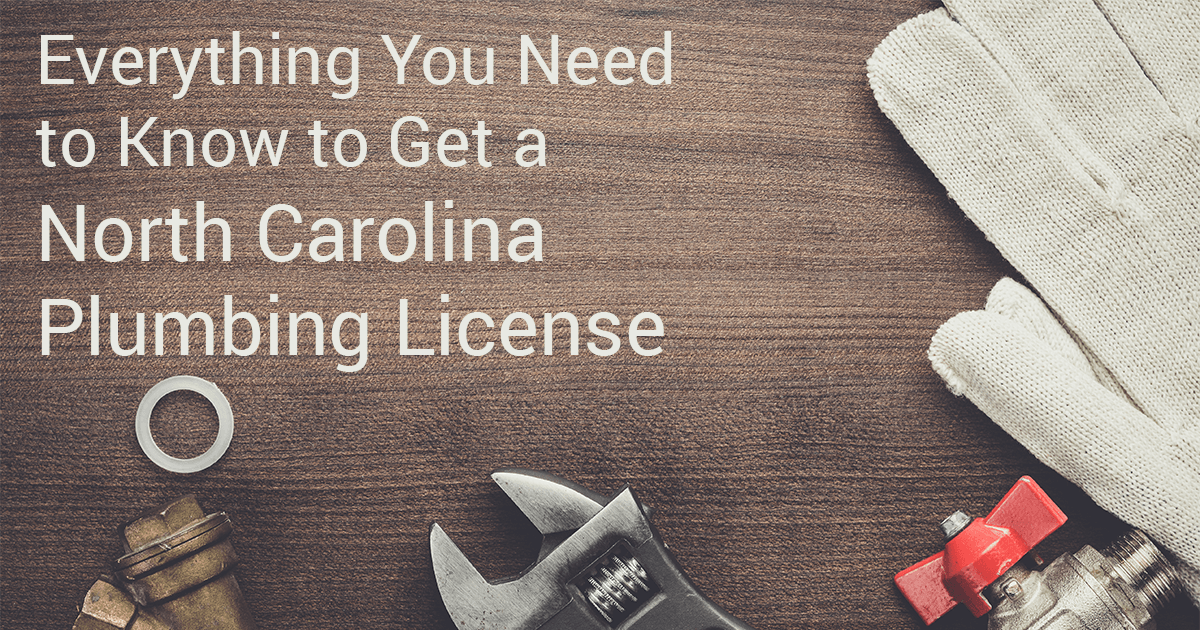Who needs to be licensed for plumbing in North Carolina?
Individuals must be licensed to perform any type of plumbing work without a licensed supervisor.
What are the types of plumbing licenses available in North Carolina?
- P-I (Plumbing-Class I) Contractor: Potable water and drain/waste/vent piping systems in any building (residential, commercial, industrial).
- P-II (Plumbing-Class II) Contractor: Potable water and drain/waste/vent piping systems in single-family detached dwellings only.
- RLP (Restricted Limited Plumbing) Contractor: Exterior building sewer piping, exterior water service piping 2″ or less, exterior backflow preventers on 2″ or less piping, water filtration systems.
- SLGT-P (State & Local Government Technician – Plumbing): Potable water and drain/waste/vent piping systems. Must be an employee of a state or local government. This is not a contracting license.
How do I get my plumbing contractor (P-I & P-II) license or Restricted Limited Plumbing (RLP) license in North Carolina?
- Obtain a copy of the Board’s Laws and Rules book.
- Meet state requirements
- You must have 2 years or a total of 4,000 hours of experience to take the exams. At least 2,000 of these hours must consist of hands-on work in installation, layout, and design.
- Complete an examination application & pay the $100 exam fee
- Include a criminal background report from CastleBranch.com
- Pass the state exams – study with online exam prep!
What are the examination fees for a plumbing contractor (P-I & P-II) license or Restricted Limited Plumbing (RLP) license in South Carolina?
$100
What code is the North Carolina plumber test based on?
North Carolina International Plumbing Code
What can I expect from the North Carolina Plumbing Contractor (P-I & P-II) license or Restricted Limited Plumbing (RLP) exams?
The state of North Carolina does not publish an outline of materials or topics that will be covered during the exam, and specifically within their reference information “Some questions are based on field experience and knowledge of trade practices, therefore, questions are not limited to information contained within the listed reference materials.”
Since we author and instruct plumbing exam preparation courses across the nation, we have a pretty good idea of the topics that will be covered. To the best of our knowledge candidates should be familiar with the following topics before sitting for the exam.
Business & Law – You will be Allotted 90 Minutes
Plumbing Portion – You will be Allotted 240 Minutes
What can I expect from your plumbing contractor (P-I & P-II) license or Restricted Limited Plumbing (RLP) exam prep course?
Business Law Exam
- Estimating and Bidding
- Business Organization
- Risk Management
- Contracts
- Project Management
- Employee Management
- Financial management
- Taxes
- Liens
- Recordkeeping
- OSHA Safety
- Licensing
Plumbing Exam
- Administration, Scope, Intent/Purpose
- Definitions and Symbols
- Plumbing Math
- General Regulations
- Fixtures, Faucets, and Fixture Fittings
- Water Heaters
- Water Supply and Distribution
- Sanitary Drainage
- Indirect and Special Waste
- Vents
- Traps, Interceptors, and Separators
- Storm Drainage
- Nonpotable Water Systems
- Subsurface Landscape Irrigation Systems
- Appendix E
- Isometric Theory
- Hands-on-Practical Application
- International Fuel Gas Code
- Copper Projects
- Practice Tests
Bonus Materials
- An overview on reading and understanding the ProV Bulletin
- A list of books you should have during the exam
- A guide to studying effectively
Is the North Carolina plumbing contractor (P-I & P-II) license or Restricted Limited Plumbing (RLP) exam open book?
Yes
What should I bring to the South Carolina plumbing contractor (P-I & P-II) license or Restricted Limited Plumbing (RLP) exams?
- Hard-bound edition of reference materials, manuals, and codebooks, in original published condition.
- The only alterations allowed in reference material, manuals, codebooks may be highlighting. No added or written text, underlining or other foreign marks are allowed. • Reference material, manuals, codebooks may be tabbed with permanent index page tabs manufactured and/or provided by the publisher.
Books
- North Carolina Administration Code and Policies, 2012 Edition
- Plumbing Code with NC Amendments, 2012 Edition
- Fuel Gas Code with NC Amendments, 2012 Edition
- Energy Conservation Code with NC Amendments, 2012 Edition
- North Carolina Board’s Laws and Rules
- Business & Project Management for Contractors 5th
Do not bring
- Candidates may not write, highlight, underline, index, or mark their reference materials, manuals, or codebooks during the examination(s).
- Candidates are not permitted to have their reference materials, manuals, codebooks tabbed with homemade, DIY, or non-manufactured/publisher tabs.
- Any additional paper (loose, taped, adhered, stapled etc.) will not be allowed in the examination room.
- Loose-leaf, spiral-bound, or ring-bound copies of the reference material, manuals, and codebooks will not be allowed in the examination room. The only exceptions to this are the spiral-bound NASCLA Contractor’s Guide (examinee’s copy) and the 3-ring bound Boiler & Pressure Vessel book (provided at the exam site).
- Taking notes of any kind at the examination site is prohibited.
- Pencils, scratch paper, calculators, ductilators, NC Heating and Plumbing Figures and the Uniform Boiler & Pressure Vessel Act of NC manual will be provided at the test sites. All materials, including scratch paper, shall be returned to the examination proctor before leaving the examination site.
Does North Carolina offer plumbing contractor (P-I & P-II) license or Restricted Limited Plumbing (RLP) reciprocity?
No
